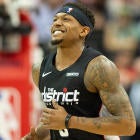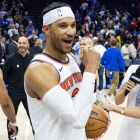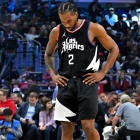One of the most intriguing questions heading into this NBA season, and potentially into next summer, is how long Bradley Beal will be with the Washington Wizards. Let's look at the scenario.
Beal is under contract for two more years. That's first and foremost. The Wizards don't have to do a thing if they don't feel inclined -- until the summer of 2021, when Beal becomes a free agent. Earlier this summer, the Wizards, on the first day they were eligible to do so, offered Beal a three-year max extension worth $111 million. He did not sign it. A couple reasons for that. First, If Beal makes one of the three All-NBA teams this coming season, he'll be eligible for a five-year super-max extension worth north of $220 million next summer. Second, Beal likely isn't ready to commit to the Wizards long-term.
The bigger question, perhaps, is whether it's in the Wizards' best interest to commit to Beal long-term. He's a fantastic player, and he just turned 26. In a vacuum, this wouldn't be a question. But with John Wall's four-year, $171 million contract extension commencing this season, all of which he could potentially miss with a torn Achilles, the Wizards are in a tight spot.
If Wall wasn't on the books for so much money, or if he was healthy, or if he was even remotely tradeable given his current contract and health, building around Beal would be something of a no-brainer. But as it stands, Beal is a real threat to leave in two years, and the pressure to move him before that rather than risk losing him for nothing will begin, to some degree, this season. Wait until next season, when it potentially becomes common knowledge that Beal wants out and the clock starts ticking, and whatever leverage the Wizards might've once had can disappear entirely.
For now, newly appointed Wizards GM Tommy Sheppard is committed to keeping Beal in Washington.
"The way that I look at this is pretty simple: If you were looking to build a team, Brad would be the type of player anyone would want to start with," Sheppard told CBS Sports. "You look at the character, the talent, the age, just the whole package ... Brad is without a doubt a core player in this league. Every team would love to have him, and we do. So we've never considered anything other than a situation where Brad is with us and leading us forward. We made that clear to him on the first day we could offer him an extension, and we'll continue to make that clear."
Sheppard went on to paint a very reasonable picture: Beal continues to grow as an All-NBA-level player, and while waiting for Wall to get back, the Wizards develop their younger players like Thomas Bryant, who they just signed to a three-year deal, Troy Brown, who Sheppard says Washington has "huge expectations for," and this year's No. 9 overall selection Rui Hachimura, who can hopefully use the increased opportunity available in Wall's absence to expedite his growth.
By 2020-21, you can make an argument that Washington could be right back in the hunt for a top-four seed and a conference finals berth -- right where they've been for the bulk of Wall and Beal's primes together. But Wall returning to form, at any point, is a major unknown. And again, even with Wall and Beal healthy and humming on all cylinders, the Wizards have fallen short of true contention. For that, they likely need another All-Star-caliber player, and they don't have the money to make that happen in free agency nor the assets to offer in a trade.
Unless Beal is the asset they trade.
And therein lies the conundrum. Keep Beal because he's your best player, or move him because he's your best asset. The Hornets kept Kemba Walker because he was, in a sense, everything that Beal is: A great person and player who had grown up with the same franchise from Day One. But in hindsight, they probably would've been better off trading him at peak value, perhaps even as recent as this past season's trade deadline, rather than losing him, effectively, for nothing a few months later as Walker left for Boston as a free agent. (Charlotte eventually worked it into a sign and trade and at least landed Terry Rozier, though most people would say they overpaid for him as something of a desperate consolation for losing Walker).
This is a tough one for Sheppard and the Wizards, who will no doubt be getting calls about Beal. At some point, someone will likely make them a pretty darn good offer. If it's good enough, keeping Beal might turn out to be riskier than letting him go.
























